The incredible success of ‘Smalltown Boy,’ the song about a young gay man who ran away from home
It was unthinkable that, in 1984 – during the conservative rule of Margaret Thatcher – a song about a young gay boy would become a success in the United Kingdom. But the tune – which was accompanied by a music video that portrayed him – went even further than that: it became a classic that touched the lives of several generations
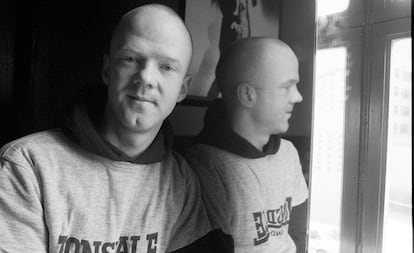
In 1984, LGBTQ+ teenagers barely had any positive role models to cling to. They were surrounded by harassment, mean jokes at school, or scandalous reports about their community in the media. But that year, a song — which was eventually accompanied by a music video — was going to change the panorama.
1984 was the summer of Smalltown Boy. The first single by a group called Bronski Beat, it took dance clubs across Europe by storm. It told the story of a lonely and persecuted boy who has to flee his home in order to be happy. The video clip – popularized in the United Kingdom thanks to MTV — showed, with unprecedented frankness, what no one had dared to show before.
Bronski Beat was formed in London around the figure (and voice) of Jimmy Somerville, who grew up in Glasgow in the 1960s and 1970s. The industrial capital of Scotland was a world of tough men, harsh weather and a permanent economic crisis. It wasn’t receptive to accepting unorthodox behaviors or sexualities. As a young gay man, his only escape route was on the dance floor, to the sound of the greatest hits of the disco genre. Songs like You Make Me Feel (Mighty Real) by Sylvester, or Don’t Leave Me This Way by Thelma Huston – disco songs that spoke about ardent, obsessive, impossible and probably illicit love — made up the soundtrack of gay liberation in the 1970s.
Still, the chances of a LGBTQ+ person to be themselves in one of the epicenters of the deindustrialization crisis of the 1970s were slim to none. So, at the end of the decade, Sommerville moved to London, where he lived as a squatter while becoming involved in groups and movements related to gay liberation during the harshest years of Margaret Thatcher’s conservative rule (1979-1990). For Sommerville — who found himself further to the left than the Labour Party — this was as much a part of his political ideology as the class struggle.
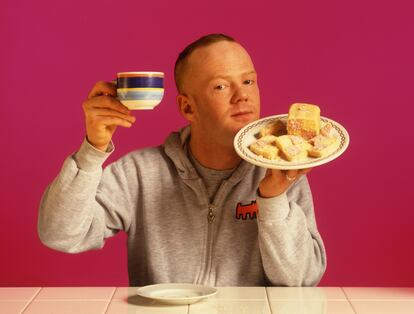
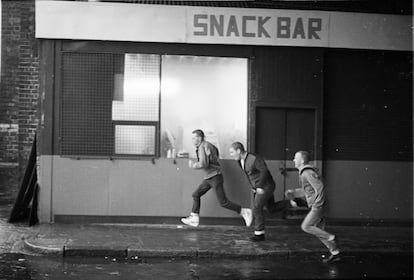
In that environment, he met Steve Bronski and Larry Steinbachek. With them, he began to experiment with synthesizers, pre-recorded sounds and his own poems. The power of his voice was evident: the petite Jimmy was a natural countertenor, who moved with astonishing ease in the world of falsetto. He managed to hit very high notes.
The guys soon began to perform in venues and events linked to the gay liberation movement. And, with successful dance songs that became part of a genre called Hi-NRG (pronounced “high energy”) — which made Laura Branigan, Stacey Q and Dead or Alive popular — it didn’t take long for them to receive offers for record deals. But always betting on creative freedom and sexual visibility, they rejected working with giants such as Trevor Horn or Stock, Aitken & Waterman. Instead, they chose Mike Thorne — the producer of Soft Cell’s Tainted Love (1981) — to make their album.
The album was titled The Age of Consent, in reference to the hypocrisy of the legalization (or decriminalization) of homosexuality in England and Wales in 1967. Under the new law, a 21-year-old adult could maintain sexual relations with another person of the same sex — provided that they were the same age or older — without the act being a crime. However, for heterosexuals, the “age of consent” was 16-years-old. In fact, the inner sleeve of the album explained the topic and included the telephone number of a support association for LGBTQ+ people.
Rather than engaging in the thinly-coded language of, say, the Village People, visibility and political struggle were apparent from the cover when it came to Bronski Beat. They were also physically distinguished by their esthetics, radically opposed to neo-romantic extravagance. They wore polos and checked shirts, jeans and Dr. Martens boots… closer to the skinhead look. In reality, it was the uniform of the anti-Thatcherite political struggle from which they emerged. Bronski Beat was the only major group to participate in the famous concert held by Lesbians and Gays Support the Miners (LGSM), in support of the 1984-1985 UK Miner’s Strike, as featured in the 2014 film Pride.
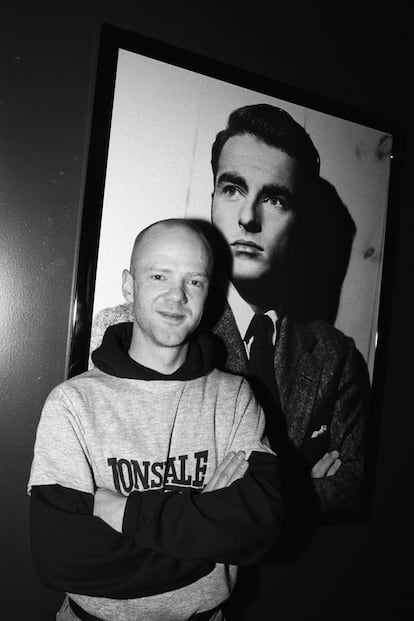
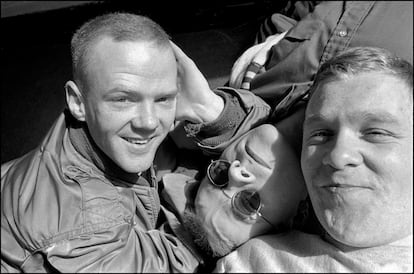
The story of Smalltown Boy reflects how many LGBTQ+ people — both at the time of the song’s release and in the present-day — are searching for a better life, far from their places of origin. Small town conservatism, bullying, parents who don’t understand and loneliness are all present in the lyrics. The chorus repeats like a mantra: “run away, turn away!” and “cry boy, cry!” However, it’s unclear if this is what the protagonist’s bullies are shouting while they kick him, or if he’s saying these things to himself.
Visual artist Carles Congost vividly recalls the impact of the song in that summer of 1984. “I remember that song perfectly: that moment, that album. For everybody else, it may have just been a dance song… but for those of us who understood it, we felt identified.”
Born in Olot — a municipality in Girona, a province in northeastern Spain – he knows perfectly well what it’s like to grow up in a stifling environment that isn’t very open to diversity. “With or without episodes of bullying, you knew that you had to leave. Your growth was stunted. You were always pretending, always acting like someone else, without being able to be yourself. You had self-censorship so internalized that, above all, you knew what you should and shouldn’t do.”
Congost has directed music videos for important Spanish bands. “I’ve always been interested [in music] as a channel to tell stories. Pop music has a capacity for self-identification: this means that, when you hear a certain song, it seems as if it’s talking about you, about your friends. And, in [the case of Smalltown Boy], ever more so. The sadness that the song contains is what I felt when I was 15.”

Homosexuality wasn’t present in the musical lyrics of the early-1980s, despite appearances. The new romantics — those commercialized, glamorous young people — spent more on hairspray and makeup than many hairdressers, but their fundamental aspiration was to attract attention for a little while, before moving on to suit jackets and catchy ballads. In the end, members of groups such as Duran Duran or Spandau Ballet would end up marrying a model on a tropical beach, or their longtime girlfriend in the neighborhood parish.
The few exceptions to this rule could cause a scandal with their looks… but take everything back with their words. Nobody better embodied sexual ambiguity as Boy George in the 1980s, but at the time, nobody knew about his stormy relationship with the group’s drummer. And, during promotional interviews, when he was asked about his sexuality, he avoided giving clear answers. Something similar happened with Freddie Mercury in 1984: he vacuumed his house while dressed in drag for the music video I Want to Break Free, but never publicly revealed his sexuality. And Elton John didn’t openly speak about his sexual preference until 1992.
Carles and Daniel
In 1984, Daniel Riera — now a photographer — was a teenager who was starting a new year of high school in the small Spanish city of Olot. On the first day of class, he met another boy who sat next to him. His name was Carles Congost. They spent that summer dancing to Smalltown Boy. They didn’t even talk about what they had in common: “To say certain things, you had to wait for the right place and time… and hope that [the other person] accepted you. But music or cinema were the things we talked about, the things we had in common,” he remembers today. “I had that album in every possible format. On vinyl, on cassette and then on CD. And I still have it and listen to it.”
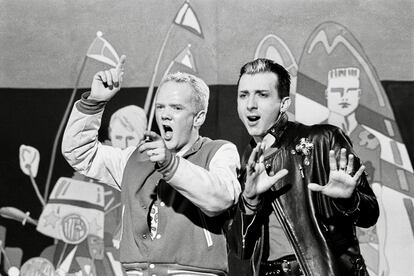
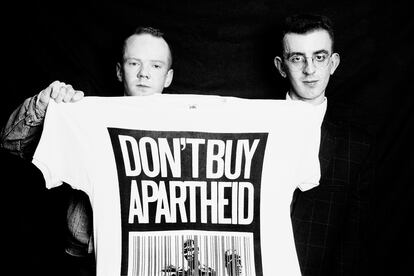
Bronski Beat’s popularity soon faded. Perhaps the concept of a group made up entirely of gay men openly singing about homosexuality couldn’t last for long in the mid-1980s. However, its singer — Jimmy Somerville — did enjoy lasting success, both alone and with another group: The Communards.
Today, Bronski Beat is remembered as a group that broke the rules, while Smalltown Boy remains a classic that artists such as Brandon Flowers have honored. It has 370 million listens on Spotify. Maybe it still appeals on a deeply personal level to someone, somewhere in the world, as much more than just a pop song.
Sign up for our weekly newsletter to get more English-language news coverage from EL PAÍS USA Edition
Tu suscripción se está usando en otro dispositivo
¿Quieres añadir otro usuario a tu suscripción?
Si continúas leyendo en este dispositivo, no se podrá leer en el otro.
FlechaTu suscripción se está usando en otro dispositivo y solo puedes acceder a EL PAÍS desde un dispositivo a la vez.
Si quieres compartir tu cuenta, cambia tu suscripción a la modalidad Premium, así podrás añadir otro usuario. Cada uno accederá con su propia cuenta de email, lo que os permitirá personalizar vuestra experiencia en EL PAÍS.
¿Tienes una suscripción de empresa? Accede aquí para contratar más cuentas.
En el caso de no saber quién está usando tu cuenta, te recomendamos cambiar tu contraseña aquí.
Si decides continuar compartiendo tu cuenta, este mensaje se mostrará en tu dispositivo y en el de la otra persona que está usando tu cuenta de forma indefinida, afectando a tu experiencia de lectura. Puedes consultar aquí los términos y condiciones de la suscripción digital.








































